|
|

 George Washington takes the helm George Washington takes the helm  Alexander Hamilton as Treasury Secretary Alexander Hamilton as Treasury Secretary  Thomas Jefferson as Secretary of State Thomas Jefferson as Secretary of State  Foreign policy problems Foreign policy problems  John Adams takes command (1797) John Adams takes command (1797) The "midnight" judicial appointments The "midnight" judicial appointments Life settles in nicely at home in the new Republic Life settles in nicely at home in the new RepublicThe textual material on this webpage is drawn directly from my work America – The Covenant Nation © 2021, Volume One, pages 174-191. |

|
|
Although the young American republic had a new Constitution, it was a very slender affair outlining very little of what we have come to understand today as government. That was just as well. Its brevity sufficed to bring renewed unity to the competitive-minded states, and its vagueness in detail left exactly just those details to be developed by the individuals who would take their place as officers of the new republic. George Washington
It was understood and expected by all (except perhaps by Washington himself who, after the war, was looking forward to ending his public duties and heading back to his farm at Mount Vernon to enjoy a less frustrating set of labors!) that the person to lead the republic as its new president was to be George Washington. After some soul-searching he once again yielded to the call of duty when it was apparent that no one else but he was expected to be the country's new leader. Thus on April 30th, 1789, he stood on the balcony of Federal Hall in New York City to take the oath of office as the republic's first president. How would he handle the office? There were a multitude of problems facing the new Republic, none of them particularly military (at least for the moment) and so his sole experience as a military officer would not give much indication as to how he would handle the challenges of civil office. The Constitution mentions only that a president is chosen for a four-year term, but elected officials in the colonies could be, and frequently were, repeatedly returned to office with a new election. Would he leave after serving only four years? Would he want to stay on repeatedly, like a monarch, ruling until he drew his last breath? Some bitter Anti-Federalists even claimed that Washington would try to make himself king – although those who knew him well were quite aware that this would have been the last thing Washington would have wanted for himself. In any case, how would he get things started as president? What kind of legacy would he leave for others to live up to and develop? The answer came quickly as he gathered together a small group of advisors to whom he could assign particular functions, a group or council similar to the British royal cabinet. Although the Constitution mentions no such institution, Washington, and all presidents after him, chose to make very important use of a cabinet of officials, some serving as personal advisors and some serving as heads or secretaries of government institutions that American presidents have long used to administer the office of president. |
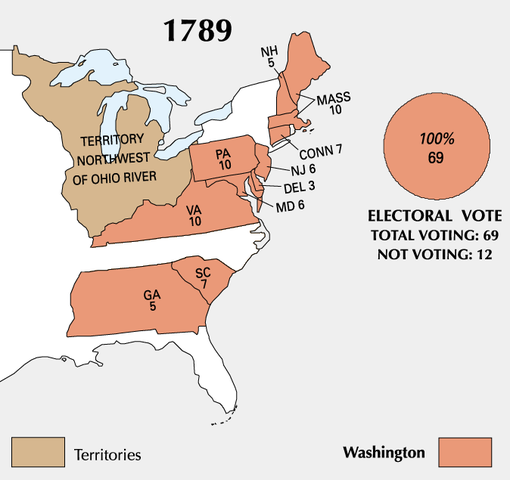
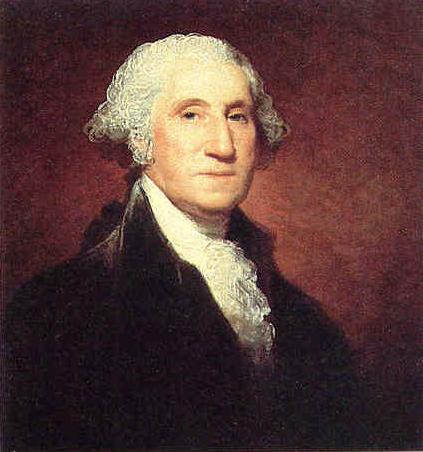
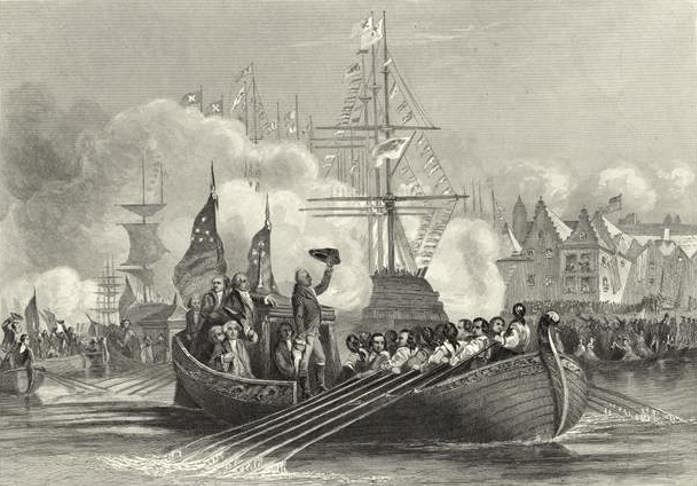
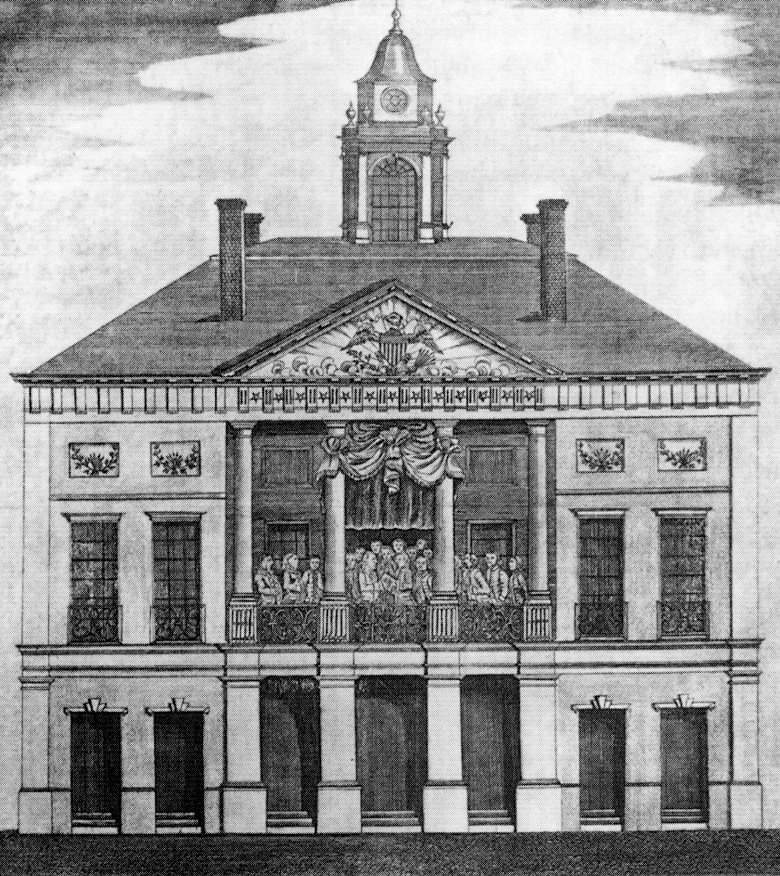
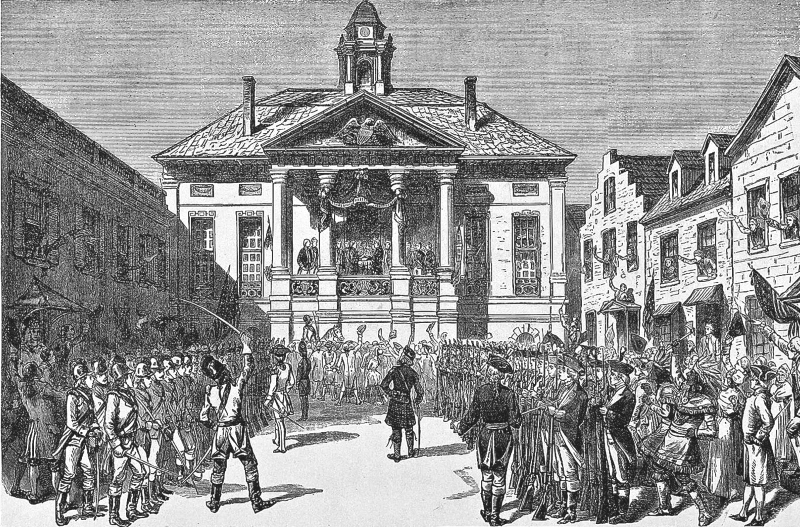
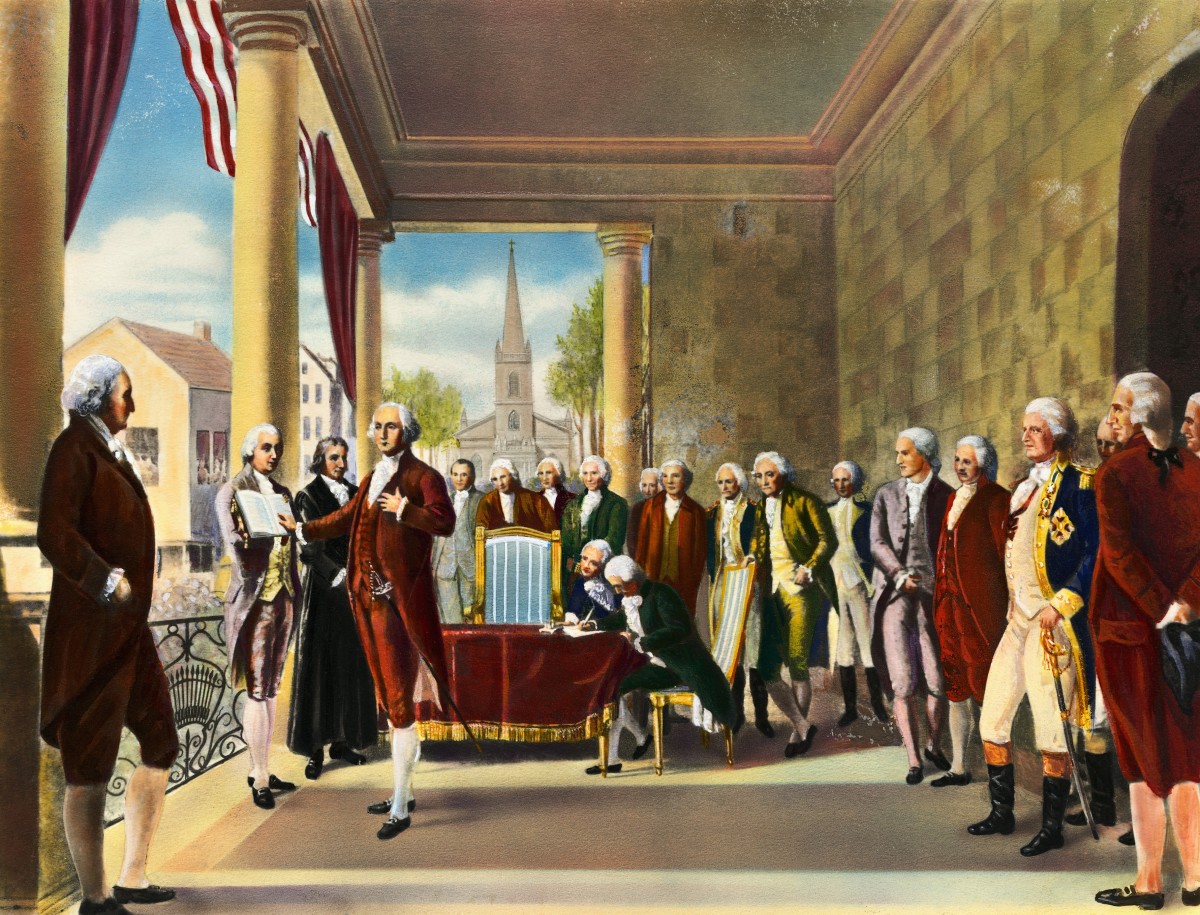
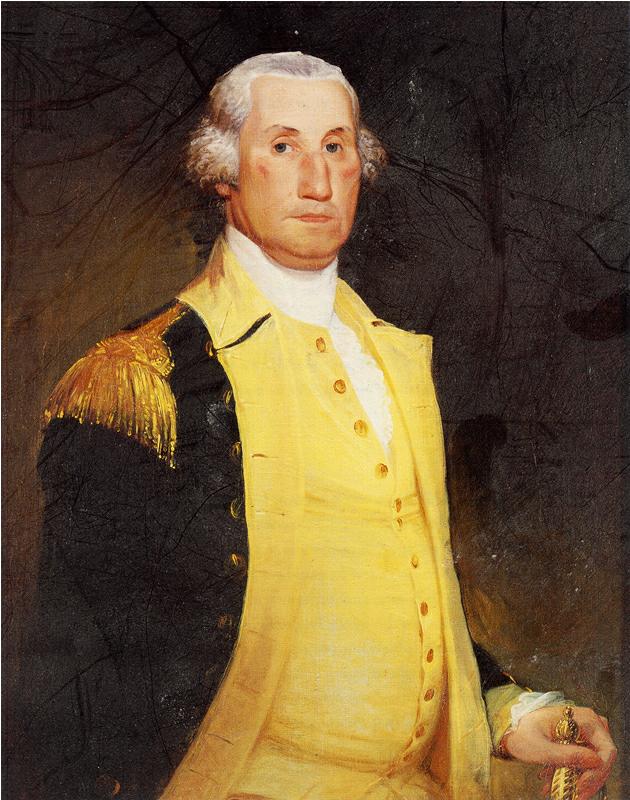
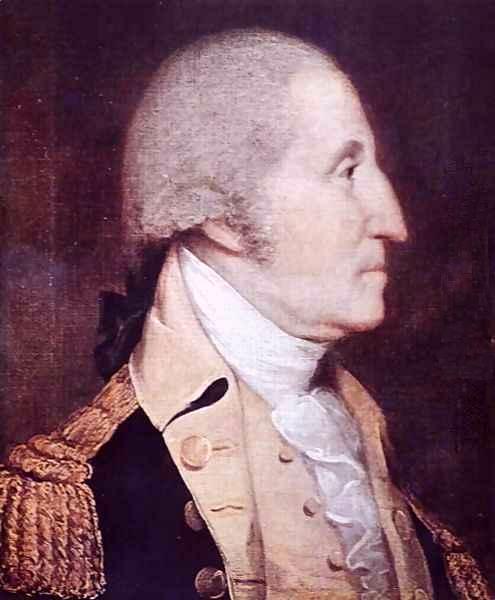
Washington's Cabinet
|
|
Alexander Hamilton
Once again, Washington called on the one person he trusted most for hard work and natural brilliance of mind (and bravery), the one person he had relied on, time and time again, in the years of the War: Alexander Hamilton. With the financial status of the new republic being the new Union's biggest challenge, Washington was quick to assign Hamilton as the United States' first secretary of the treasury. Hamilton was actually born (year uncertain) not in one of the American colonies but in the Caribbean, under peculiar family circumstances (that would be the object of much commentary by his later political enemies) and was forced to look after his own survival at a very early age.1 But he was a very avid reader, bi-lingual (English-French), and a self-educated apprentice clerking for a local merchant (possibly his actual father), and at seventeen wrote an essay published in the local newspaper. The essay was sufficiently impressive that it led local community leaders to gather a fund to send Hamilton off to New Jersey in 1772 for formal education (prep school). In 1773 he began his studies at King's College (Columbia University) in New York, where he quickly distinguished himself as an excellent orator supporting the colonies' growing spirit of rebellion against British royal authority. Hamilton also wrote at the same time a number of outstanding articles and essays in support of the same cause. Yet he was also of a cautious or fair mind (perhaps because of his own sufferings as a youth) and in May of 1775 came to the defense of the college president, allowing the man to escape an angry mob, while Hamilton challenged the mob not to attack Loyalists or their cause in this manner. However, Hamilton was himself quick to take up arms and join with friends in the New York militia, undertaking at the same time (again, on his own initiative) the study of military history and military tactics – and soon put that knowledge to use in leading a raid on a supply of British cannons in the Battery! He then went on to organize his own artillery company, elevating himself thereby to the rank of captain. His company soon joined with Washington's troops in the various battles that raged across New York City, and then across to New Jersey, where his artillery kept the Hessians under fire at the Battle of Trenton. His talents were quickly recognized, and he was asked by various generals to join their staff. Yet he understood that glory was to be found on the field of battle, not on the general staff of a commanding general ... that was until Washington made the same request. That was an offer that Hamilton was willing to accept. And this changed his life, and America's, forever. As chief of staff he was assigned the task of maintaining written communications with the Continental Congress, the governors of the new states, and with other generals. Over the course of four years, as Washington's confidence in Hamilton became virtually total, Hamilton himself issued detailed military instructions to officers under Washington's command, and supervised both diplomatic and intelligence operations coming from Washington's command. Thus it was that he met French General, the Marquis de Lafayette, and became close friends with him in the process. Finally at Yorktown, Hamilton's long desire to actually serve directly under fire, came into play – with Washington's very hesitant permission! It was Hamilton himself who led the American attack on one of the two vital redoubts still holding the British line in the latter's desperate defense at Yorktown. It was a brave, but probably very foolish, move on Hamilton's part. But he obviously survived, adding even more to his enormous stature in the eyes of Washington. After the war he formed a law partnership with a friend and found himself, among other things, defending Tories who were suffering from the post-war anti-British backlash, typical of his sense of fairness. But he was nonetheless very interested in seeing his new Republic move forward into its own distinct future, and thus in 1784 founded the Bank of New York, the beginning of his entry into the world of large-scale financing. He was as interested in the political future of the country as its financial future and two years later attended the Annapolis Convention, drafting the resolution which called for the Constitutional Convention that eventually produced the U.S. Constitution. The next year he became an assemblyman in the New York State Legislature, which sent him as one of its three representatives to the Convention in Philadelphia. And of course it was he who wrote most of the articles that formed the famous Federalist Papers, advocating the adoption of the new Constitution. Washington had not forgotten Hamilton and the military service he had performed for him. He knew Hamilton to be intensely loyal personally, intensely brave, intensely intelligent, intensely competent, and intensely dedicated to serving his newly independent country. And so it was that Washington turned to Hamilton to see what Hamilton could do to help him put the new country on a strong financial footing. Thus he asked Hamilton to become his secretary of the treasury. Hamilton's debt assumption program
As it had always been during the war, one of the biggest problems facing Washington and the struggling young Republic he was expected to lead was money. Always money! By war's end, the Continental Congress had run up a $54 million debt, and the states an additional $25 million. Also, the promissory notes or bonds issued during the war by the Continental Congress, by the various states, and by the army had been bought up by speculators after the war at fifteen cents on the dollar. Most people believed that they were not worth even that much. In other words, the creditworthiness of the Republic was almost nil. Hamilton however had some well-developed ideas as to how he wanted to meet that challenge. He proposed to Congress (January of 1790) a method of clearing the debt by what he called assumption: the federal government would assume all of the debts and begin the process of repaying them – at full value! America would pay its debts. T he world could take confidence in that. It was indeed financial confidence that Hamilton was trying to restore. To meet this obligation, the Republic would itself borrow (issuing its own promissory notes or bonds) to cover the debt through bonds issued by a newly created national bank: the Bank of the United States (BUS). Besides financing the repayment of the national debt, principally through heavy taxes on imports, the BUS would also fund public economic infrastructure projects and private industrial investment for national development. 1His
mother was married but separated from another man when she met and
married (thus illegally) James Hamilton, Alexander's presumed father.
When her legal status was brought to light, James left her and young
Alexander. Then when Alexander was only thirteen his mother died,
leaving Alexander an orphan. |
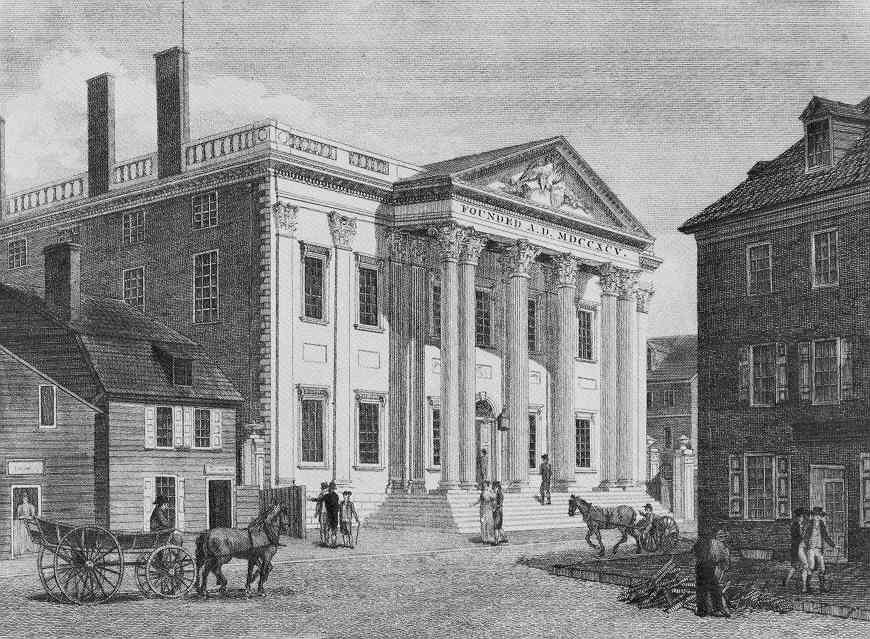
Library of
Congress
| Hamilton's
program was designed to found the nation not on the democratic whims of
the masses but the hard-nosed realism of the moneyed class that
commanded the American economy. Understanding the mind-set of America's
moneyed class, Hamilton planned to involve this class in the new
government by inviting wealthy financiers to exchange the old
Continental Congress's bonds with the Republic's new bonds. This would
give these individuals a very strong financial interest in seeing the
new government succeed. And, most importantly, it would place the new
government's finances on very strong foundations.
Money is power. And the new nation needed power in order to survive in a very competitive world. Strong financial foundations were absolutely essential for a Republic trying to establish itself as a serious, viable institution in a very challenging world. But the reaction to his proposals was swift. The heart of the reaction was this matter of great principle found in the personal debts hanging over the Patriot foot soldiers during their wartime service (loans or mortgages for their homes and land they owed various banks), when they were in no position to meet or pay down on those debts. After the war they had returned to civilian life only to find that those debts had gr own even larger while they had been away in the army. Worse, they had been paid for their wartime services with the almost worthless notes issued by the Continental Congress. They retrieved what value they could by selling these notes to speculators for whatever they could get, never enough however to meet the heavy financial obligations hanging over them. And now, here was Hamilton paying those speculators full value for these notes bought on the cheap from penniless citizens. This all seemed very unfair, sort of a double slap in the face of America's small heroes. And there was also the irritation of the states such as Virginia, which had paid off its own debts in full. Why should they be part of a program assuming the debt of the states that had not done what they had done? There was a lot of anger that arose over Hamilton's program. Jefferson's friend Madison was most vocal in his indignation at Hamilton's idea of debt assumption because it seemed to be developing at the heart of the federal system a power center on the order of the royal tyranny America had just freed itself from. Madison's strong stand eventually pushed Jefferson into an ever-stronger States-Rights (or Anti-Federalist) position. And it cost Hamilton his friendship with Madison, who as a former Federalist, now turned into an equally dedicated organizer of an Anti-Federalist group headed up by his fellow Virginian, Jefferson. As it turned out, Washington threw his support behind his treasury secretary and Congress moved ahead to approve Hamilton's program. And indeed, it did put the new Republic on fairly firm financial footing. But it had opened a wide political wound between the Federalists and Anti-Federalists that would not be healed. As Madison himself had forecast (and in the Federalist Papers had justified as necessary to the proper functioning of a representative government) America took its first steps toward a two-party political system: Hamilton's Federalists in competition with Jefferson's Anti-Federalists, who under Madison's tutelage would organize themselves as the Republicans (not related to the modern Republican Party) |
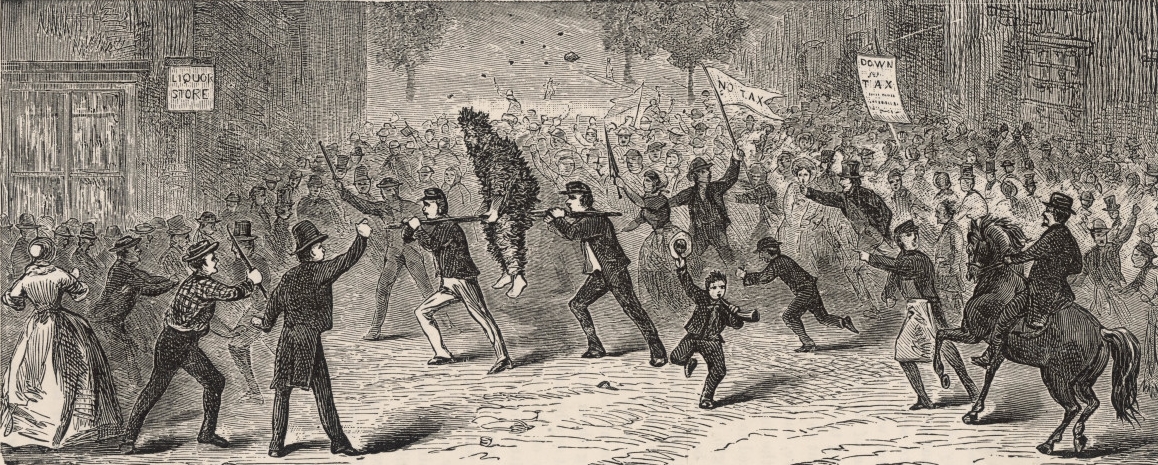
One of Hamilton's federal revenue collectors being tarred and feathered by irate farmers
during the Whiskey Rebellion in Pennsylvania (1791-1794)
|
The Whiskey Rebellion of 1791-1794
But paying off that debt was proving to be highly difficult. When Hamilton had raised import duties as high as he felt he could go before it would start crippling American business, in 1791 Hamilton placed an excise tax on the production of whiskey, a basic essential in the diet of the American farmers – and also a means of currency in the farmers' businesses. Understandably, the new tax met with the same resistance that had George III's 1773 tea tax imposed on his American subjects to pay for his wars. Westerners from upstate New York, through Western Pennsylvania, into Ohio and Kentucky, Western Maryland and the Western Carolinas all got increasingly involved in the refusal to submit to Hamilton's tax. Complicating matters was the fact that Eastern distillers could be much more efficient in the massive production and local distribution of their product and thus proportionately much less burdened by the excise taxes than the frontier farmers. Consequently, Eastern distillers offered no objection to the new tax. However, this differing situation facing the Eastern producers and the Western farmers merely added to the enormous frustration of the latter group. Washington, however, agreed with Hamilton that the toleration of the insubordination in the West would collapse the authority of the Republic. It was a hard thing to do to come up against these strong souls, many of whom had fought alongside Washington in the War of Independence, a war that had had similar roots in its resistance against George III's new taxes. But ultimately the question was not about taxes (for a government cannot operate without an income stream of some kind) but about the legality of those taxes. The Republic needed everyone involved in the support of their new government, not just the business and financial classes of the Eastern cities, in order for the Republic to succeed and not fail. And finally, just as in the need to maintain discipline in a war-time army, the Republic would fail in peace-time unless it too could get compliance to its laws, laws properly or legally instituted and properly enforced. Lack of political discipline would certainly destroy the Republic. Events going on in Paris (the French Reign of Terror, 1792-1794) at that very same time were making this matter quite clear. Street mobs had taken control of the effort to birth the new French Republic and it was looking increasingly likely that the French Republic was thus going to fail in its efforts to get itself established. Now the very same threat seemed to hang over the young American Republic at this point. Thus in August of 1794 Washington led a 13,000-man army into Western Pennsylvania to confront protesters (who quickly melted away at the appearance of Washington and the army). The show of force broke the rebellion. The authority of the Republic's government was thus confirmed. But ultimately, the event only deepened the distrust by the rural Westerners (and Southerners) of the moneyed class of up-East Federalists. The Kentucky Question
This event and the growing regional distrust would register itself clearly in the form of a dispute when Kentucky applied for statehood. The up-East Federalists dragged their feet, fearing they would be overwhelmed in Congress by a growing Southern/Western coalition lined up against them. Finally a compromise was reached in 1791 when New England's Vermont was admitted to the Union, opening the way in 1792 for Kentucky to be admitted as a new state as a counterbalancing principle in the politics of statehood, a principle that would be applied again and again as the country struggled over deep cultural differences that separated the various regions of the country. |
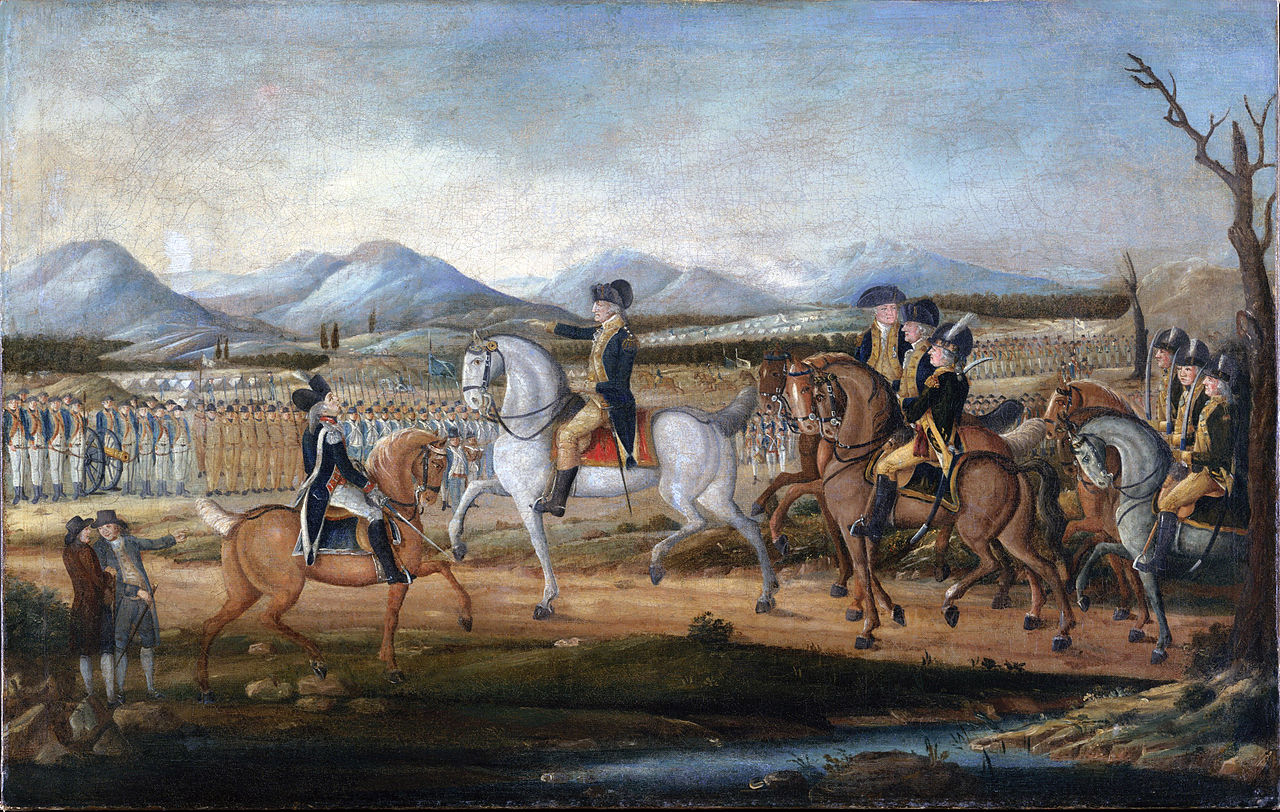
|
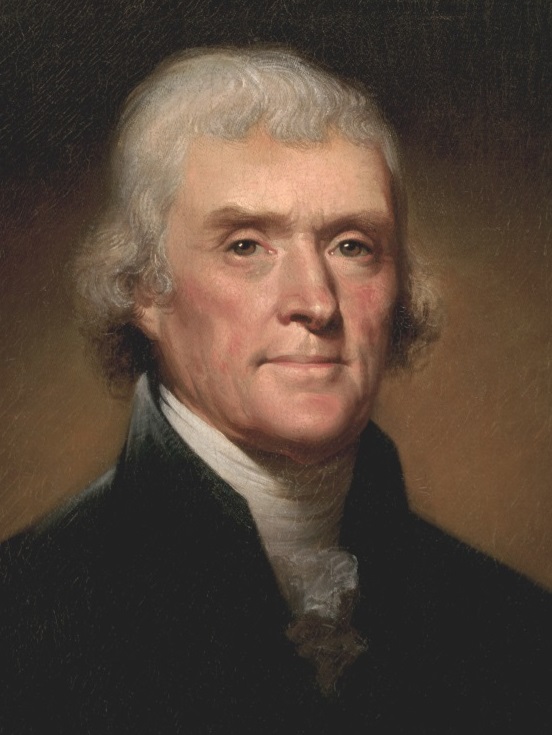
|
Thomas Jefferson
Washington had appointed Jefferson to his cabinet as his secretary of state, charged with overseeing America's diplomatic missions abroad and (supposedly) advising Washington on foreign policy matters as the need arose. Jefferson would not be easy to work with. Jefferson was born to a Virginia planter family, with important family ties – especially on the side of his mother, Jane Randolph, a cousin of Peyton Randolph, who was a leading political figure of Virginia during the 1760s and early 1770s.2 At an early age Jefferson was tutored along with the Randolph children, and as a youth, in classic aristocratic fashion, he was taught Latin, Greek and French, along with history, science and the classics. At age sixteen he entered the College of William and Mary, where he continued his study of these same disciplines. He graduated two years later to begin his study of law under the prominent George Wythe. And at age twenty-one he inherited 5,000 acres and fifty-two slaves from his deceased father's estate, including the land where he would begin the building of Monticello, the place of perfect habitation developed from his own ideal design. He was admitted to the Virginia bar in 1767 and as a practicing lawyer represented his county as a delegate to the House of Burgesses (1769-1775). In 1772 he married a third-cousin, Martha, and settled into a period that was perhaps the happiest of his life. In the ten years of their marriage she bore him six children, only two of which survived to adulthood.3 They also inherited from her father another 11,000 acres and 135 slaves to work the land, but also a heavy debt that accompanied the title. When he was sent to represent Virginia at the Second Continental Congress in 1775, he befriended John Adams. And thus he was invited to join the committee assigned the task (supposedly Adams's responsibility) of drafting a Declaration of Independence, the startup version which was ultimately assigned to Jefferson. Some changes were subsequently made to Jefferson's draft by the committee, then by the full Congress (as we have already noted, about a fourth of the whole was cut out, including a section connecting King George and the slave trade!). At the time, the Declaration seemed to be a much less significant matter than all of the new state constitutions being drafted by the thirteen newly independent states! Shortly after this (September of 1776), he was elected to the new Virginia House of Delegates. Here he served on the committee working on the new Virginia Constitution, and sponsored the Bill for Establishing Religious Freedom, forbidding state support of religious institutions or doctrines – which however failed to pass. Two years later he was given the responsibility of reviewing and editing Virginia's system of laws. And the year after that (1779) he was elected as the state's governor, undertaking at that point to institute new laws in pursuit of his personal worldview concerning religion, education, property rights, etc. When in 1781 Benedict Arnold, at that point serving the British, attacked the new Virginia capital at Richmond, Jefferson and members of the Assembly were able to escape to Monticello (Richmond was burned to the ground). Then when Cornwallis approached Monticello, they escaped from there to another of his plantations to the West.4 After the war (1783) he became a delegate to the Confederation Congress where he chaired the committee that drafted the 1784 Land Ordinance, removing the Northwest Territories from the on-going land title conflicts among the states by making them territories eventually eligible to become states of their own. Also, slavery was to be outlawed in these territories.5 In 1784 he was sent to join Franklin and Adams in Europe in the effort to negotiate trade agreements with England, France and Spain (Franklin returned to America the next year). Jefferson quickly (1785) made himself at home among the French, befriending the Marquis de Lafayette in his effort to develop improved trade relations between the U.S. and France. He also fell in love with the French lifestyle (including its wine and books). Then soon after the French Revolution broke out in July of 1789, he returned to Virginia, intending however to return soon to Paris. But the request by Washington to serve as his new secretary of state (charged with the responsibility of supervising the country's diplomatic mission) caused him to remain in America. But this would bring him into direct contact with Hamilton, a man whose views Jefferson by instinct opposed on virtually every front. Hamilton was very supportive of a strong central government, able to unify the functioning of the thirteen states, politically as well as economically. This Jefferson opposed strongly, fearing that such a strong central authority would compromise greatly the states' rights to conduct their own affairs as they chose. He was thus highly opposed to the concept of a national authority (until he himself later became president of that very nation!). Furthermore, unlike the almost spiritual rapport that existed between Washington and Hamilton, Jefferson and Washington lived in very different universes when it came to foreign policy and diplomacy. Even though Jefferson was supposed to be in charge of the conduct of foreign policy, it was usually to Hamilton that Washington turned rather than to Jefferson when faced with a foreign policy issue needing to be resolved. Jefferson grew increasingly resentful over this. A big part of the problem was that Jefferson was by nature an intellectual who lived in a world of perfect plans and grand schemes. He was also personally smitten by French culture and had become deeply involved in the Enlightenment dreams of the French intelligentsia that eventually took over the French Revolution – and drove it to the human butchery of the 1793-1794 French Reign of Terror. And Jefferson, even though saddened by the gruesome excesses of French Republicanism, refused to admit that there was any injustice in how these cruel events were unfolding in France. A greatly self-blinded Jefferson was quite certain that 99 percent of the Americans supported strongly, even gladly, the events going on in France. Thus despite the carnage, he convinced himself that it was France that needed America's total support in the ongoing English-French conflict.6 Hamilton and Washington, on the other hand, despite the recent war with their English cousins, still considered England as America's best partner when it came to the contests involving European politics and economics, which seemed always unavoidable, especially to such a trading people as the New England Yankees. There really was no way to side-step the ongoing French-English conflict, and neither France nor England would let America get away with being merely neutral in the struggle. One way or the other, America would constantly have to choose sides, not usually happily, whatever the choice. And in choosing sides it usually ended up pitting Hamilton and Washington against Jefferson (and Madison). Jefferson grew increasingly furious about how Washington was lining up behind Hamilton and the pro-British Federalists and in December of 1793 resigned his position on Washington's cabinet. From then on, he and his Republicans would be active opponents of Washington and his Federalist cabinet. 2Randolph was speaker of the Virginia House of Burgesses (1766–1769), was the president of the First Continental Congress (1774) and president of the Virginia Convention debating independence from Britain (1775, just before his death that year). 3Already sick from diabetes and her frequent childbirths, she died in 1782 at age thirty-three in delivering their sixth child. 4It was later that year decided by the Assembly that Jefferson had acted appropriately. But he had lost such stature that he was not reelected governor. 5His anti-slavery provision was not approved at the time, though reintroduced and subsequently approved when the ten territories were consolidated into five territories, the future states of Ohio, Indiana, Illinois, Michigan and Wisconsin.6When William Short, a Jeffersonian supporter, wrote Jefferson from Paris that mobs had taken over the French Revolution and had executed some of their French friends, Jefferson in early January of 1793 wrote back a sharp rebuke: "The liberty of the whole earth was depending on the issue of the contest, and was ever such a prize won with as little innocent blood? My own affections have been deeply wounded by some of the martyrs to this cause, but rather than it should have failed I would have seen half the earth desolated; were there but an Adam & Eve left in every country, & left free, it would be better than as it now is." |
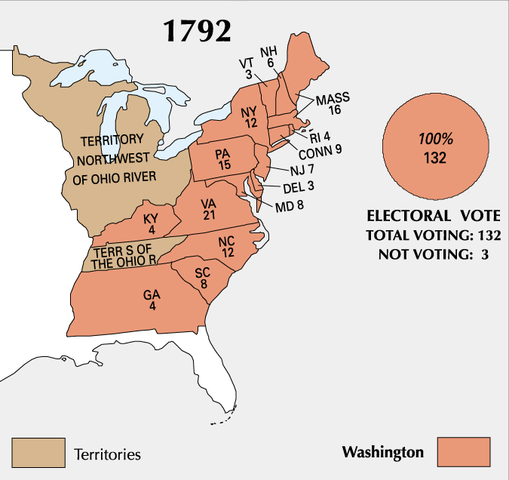
|
|
|
Washington refuses to take on a third term as president
Washington had originally agreed to serve only one term as president (1789-1793), but had been prevailed upon to run for a second term in the approach to the 1792 elections. He grudgingly accepted the request. But now in 1796, as he approached the time for the elections for a third term in office, he made it very clear that under no circumstances would he continue to serve as president once his second term in office ended in early 1797. He was tired of the bickering between the Federalists and the Republicans and wanted simply to go home to his farm at Mount Vernon. Washington was thus more than willing to oversee a smooth handover in power to his successor, which in this case was his vice president, John Adams. And so it was that Washington set the constitutional tradition that two terms in office was something of a limit to presidential service. America would not be saddled with a president-for-life, as so frequently happens in new republics.7 7President
Franklin Roosevelt, however, would run for a third and even fourth term in the
1930s and 1940s using the emergency of the World War (Two) as
justification for doing so. But Washington's "two-terms-only"
presidential tradition was ultimately confirmed as a Constitutional
Amendment (the Twenty-Second) in 1951. |
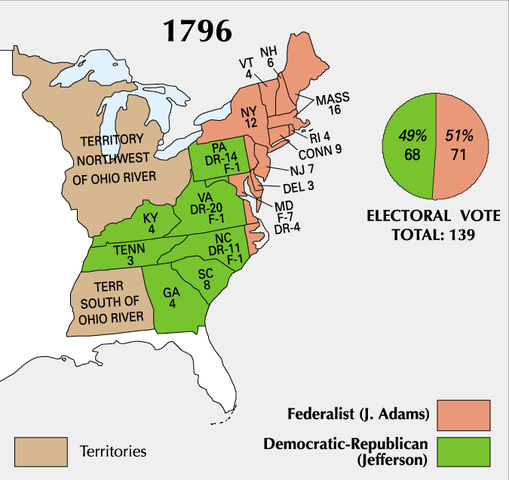
John
Adams – 2nd President of the United States – by Gilbert Stuart
National Gallery of Art
|
John Adams
Although Adams was a staunch Federalist, he was very sensitive to his own place in the scheme of things politically and socially, and found himself frequently at odds with not only Jefferson and his Republicans, but also Hamilton, who after Washington, was the strongest figure among the Federalists. A man of high moral principle, Adams unfortunately was lacking in the tact necessary to put those principles to use without raising a lot of powerful opposition. Sadly, he went largely unappreciated in his own days and by his own people for the way he helped follow up Washington's lead in bringing the country to even greater stability and security – at a time when huge dangers still swirled around the young Republic. Adams had grown up in a small Massachusetts town to a family that held strongly to the original Puritan beliefs and ethics, stressing basic human equality in God's (and thus man's) eyes, the importance of working to achieve rather than merely inheriting one's place in life, and the critical nature of personal integrity, no matter the possible social cost for living true and honestly. Also in typical Puritan fashion, there was an early emphasis in his family on the importance of formal education which Adams began at age six, then continuing into Latin School, and at age sixteen entering Harvard College. But he disappointed his father when he dismissed any ideas of becoming a minister and graduated from Harvard instead as a teacher, pondering the question (that he faced most of the rest of his life) of how to become great. This of course put him in conflict with his sense of Puritan morality, a conflict that he would never successfully resolve. Law nonetheless seemed to offer the best path to the greatness that he so eagerly sought. Thus he clerked for a prominent local lawyer and in 1758 received his master's degree from Harvard and was soon admitted to the bar. Eventually his legal work would draw him into the cause against growing royal authority in the colonies, for which he began to write (anonymously) in the Boston newspapers. In 1764 he married a third-cousin and preacher's daughter, Abigail, and proceeded to have six children in fairly rapid succession (the last however did not survive birth), the second born (and first son) being the future president, John Quincy Adams. Adams came to public attention when in 1765 he published a letter sent to the Massachusetts legislature concerning the highly controversial Stamp Act, restating in very clear and compelling terms the rights of Englishmen concerning both taxation and judicial treatment by the authorities. This helped to bring about his election to public office as a representative on the town council. In 1768 he moved his family and law practice to Boston. But his law practice did not come into prominence until he defended the British Redcoats accused of murdering members of the Boston crowd who had been taunting the soldiers. He claimed that he feared that this might damage his reputation. But instead it helped him to gain a Boston seat on the Massachusetts legislature three months later and a considerable increase in his law business.8 Seemingly Adams had finally found his path to greatness. But this came amidst growing chaos in Boston, and in 1774 Adams moved his family back to the family farm in Braintree – permanently. However, he continued his work in Boston in the thick of a darkening war cloud. He delivered a hallmark speech in the legislature challenging the British governor with the claim that Massachusetts had always been self-governing; that its charter was only with the King, not Parliament; and that the colonies would have no other recourse if Massachusetts' rights were not respected by British authorities than to take the road of full independence from Britain. These ideas were then extensively developed in a publication that clearly outlined the legal arguments behind them. At this point Adams had secured a very prominent position in the growing debate.9 Quite naturally Adams was sent by his state as one of its representatives to the First and Second Continental Congresses (1774 / 1775-1777). At first he was looking for ways to bring Britain and the colonies back into a better relationship. But seeing no flexibility coming from London, he soon found himself working hard to convince his colleagues that full independence was the only path at that point open to the colonies. And in mid-1775 he was the one who put forward the name of Washington as the one to lead the colonial army gathering around Boston (a careful move to secure Virginia to the cause). In 1776 he got confirmation from Virginia with that colony's Resolution joining the cause, and was subsequently appointed to head the committee assigned the task of drafting a Declaration of Independence. Jefferson wrote most of the draft, but it was Adams who guided its passage through the Continental Congress. Soon after this, Adams was sent with Franklin to hear the terms that General Howe was willing to offer after a series of defeats of Washington's army in New York. But the discussions led nowhere when the American representatives showed no sign of compromising on their decision for full independence. Adams was now a hunted man (on the list of treasonous colonials who would have been shown no mercy if the rebellion had finally been put down by the Redcoats). During the next couple of years Adams worked tirelessly on a number of committees backing the war effort, learning important administrative procedures through his extensive service to the cause. Then in 1778 he was appointed (along with Franklin and another American) to represent the new United States in negotiating a treaty of alliance with France, then returning home – only to be sent back the following year to begin discussions in Paris with British representatives to work out some kind of peace terms (Adams in the meantime developing some fluency in the French language!). Adams was a contentious person (as he himself well knew) and did not find it easy working with Franklin, whose well-staged homespun manners that so attracted the French Adams himself detested with equal vigor. Nonetheless, the British (especially after the humiliation at Yorktown in 1781) were gradually willing to back down and acknowledge American independence, and work out the compromise (land rights to the West and compensation for civilian property losses on both sides of the conflict) that eventually led to the Treaty of Paris in 1783. In the meantime, Adams had been appointed ambassador to the Dutch Republic (1780), securing that country's recognition of American independence in 1782 and also securing from Dutch banks valuable loans needed to help the American states get on their feet after the war. With peace at hand, Adams was appointed in 1785 as America's first ambassador to the English Court of St. James, where he sincerely sought to restore friendship between the English-speaking peoples on both sides of the Atlantic. Here in London he put together another written work, defending the new U.S. Constitution just after its adoption in Philadelphia in 1787. Though not as famous as the Federalist Papers, it was itself a very clear definition of how in a republic a system of checks and balances among different branches of the people's government was essential to keeping power operating safely within the bounds that the designers of the Constitution intended. When elections for the presidency of the new Republic were held in 1789, Adams came in second behind Washington in the count, thus by the understanding of the times becoming the nation's first vice president. But with this, Adams disappeared from public view, as was typical of those called to that office. Washington never drew on Adams' services, never consulted Adams on any issue. This left Adams resentful against Hamilton whom the president frequently consulted and even against the president himself whom he visibly supported but for whom he developed a personal dislike. But at least the office put him in something of a position to be the heir-apparent to the presidency when Washington indicated in 1796 that he definitely was retiring from public service. But Adams was going to have to face Jefferson and his alliance of mostly Southern Republicans, plus the question as to whether or not Hamilton would put his Federalist support behind Adams (he did, because Hamilton despised Jefferson more than he disliked Adams!). In the end Adams narrowly defeated Jefferson with his seventy-one electoral votes to Jefferson's sixty-eight votes, the voting being almost entirely a northern versus southern state electoral division. Thus Adams became the nation's new president, and Jefferson (being in second place) became the nation's vice president. The XYZ Affair
Troubles with Europe continued to rock American politics as Adams assumed his presidential office. But it was now France's turn to play the role of seizing American vessels, hundreds of them. Jefferson and his pro-French Republicans were embarrassed into silence over this French arrogance. As for Hamilton and his pro-British wing of the Federalists, they jumped at this opportunity to demand a declaration of war against the French. Adams sent a delegation to Paris in 1797 to try to find a remedy to the problem. But the delegation was met by French agents X, Y and Z, who demanded bribes and a loan before the Americans would be allowed to meet with French foreign minister Talleyrand. The Americans refused and returned to the U.S., with the news of the "XYZ Affair" stirring even greater war fever among the indignant Federalists under the slogan, "millions for defense, but not one cent for tribute!" 8Analysts determined that he had skillfully selected just the right jury members (many of whom later became pro-British Loyalists), and that from that moment the outcome of the trial was a foregone conclusion (six soldiers were acquitted and two convicted of the lesser crime of manslaughter). 9However,
his more flamboyant cousin Samuel Adams was at the time even more
prominent – having led the Boston Tea Party dumping tea in the Boston
harbor in 1773! |
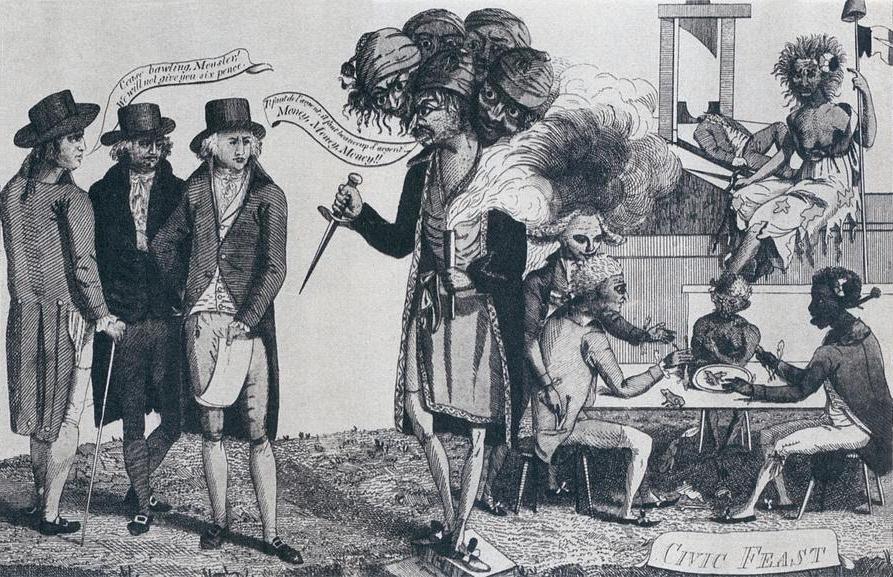
|
The Alien and Sedition Acts (1798)
But this then raised among nervous Federalists the specter of pro-French treason at home (not too subtly aimed at their Republican rivals). In 1798 the Federalist majority in Congress rushed through to passage four Alien and Sedition Acts (which Adams unfortunately signed into law) empowering the president to deport pro-French traitors and to penalize any pro-French seditious language that might come from (Republican) newspapers and public speakers. In the end all this succeeded in doing was drive the Republicans even deeper in their resolve to oppose the Federalists at all costs. The doctrine of nullification
The strongly Republican Southern and Western states of Virginia and Kentucky, in bitter reaction to these Acts, passed their own Resolutions (authored by Jefferson and his ally Madison) affirming that Congress had no constitutional right to intervene in the internal affairs of the states and their people. As the Constitution was the product of the action of the states (or so the Republicans claimed anyway), it was the states, not Congress, that had the last say in what was constitutional and what was not. The states were the ultimate sovereign authority within the Union, not Congress. The states thus reserved for themselves the power to nullify acts of Congress which they regarded as being unconstitutional. This constitutional issue, of course, would be a matter that would continue to be hotly debated until it finally led to full civil war in the mid-1800s. The Quasi-War with France
The treaty did not at all please the Hamiltonian Federalists, nor did it suffice to restore for Adams friendly relations with the Jeffersonian Republicans. But he signed the treaty anyway, suspecting that by doing so it would end his political career. Indeed, one month later, during the 1800 presidential elections, Adams was voted out of office, having served only one four-year term. And thus it was that Adams had given up the presidency in order to bring the country back from the brink of war. |
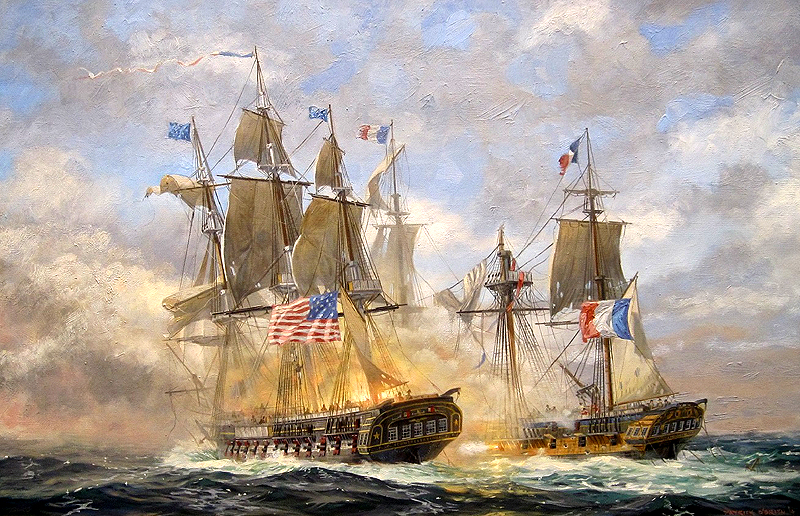

|
|
Interestingly, the very last act of his presidency would be the one thing of his presidency that would come to have lasting constitutional value: the creation by Congress and appointment by Adams of individuals to some six dozen judicial posts, including the fateful appointment of the Virginian John Marshall as chief justice of the Supreme Court. These mostly new positions resulted from Congress's recent Judiciary Act of 1801, which expanded the number of Judicial posts (which indeed were too few to handle the large caseload before them), an act that was rushed through a lame duck10 Congress of a majority of Federalists, many of whom had just lost the federal elections to a new Jeffersonian Republican majority, but had a few weeks of time remaining in office before the newly elected Congress could take its place in the new capital city of Washington, D.C. (actually at this point a forlorn collection of shacks, muddy lanes, and farm animals!). In fact the job was so rushed that Adams spent his last night in office completing the task of making these judicial appointments, thus earning them the reputation from the Republicans as the "midnight judges." With this last act of public service completed, Adams quietly slipped away from the capital to his home in Massachusetts, a rather tired and bitter old man. He hadn't even bothered to stay long enough to see the new president of the United States, his once close colleague but now strong political rival Jefferson, sworn into office. But once again, the simplicity of this procedure would demonstrate that in American political culture, defeat in an election meant not a prolonged challenge to the results by a resentful loser, but a peaceful transfer of power to the winner. It had been that way since the founding of the Anglo-American society in the early 1600s, and would continue as an important political tradition into this new era of Republican government.11 10The term "lame duck" refers to office-holders who have been voted out of office in an election that went against them, but who still hold the office for a brief period until the newly elected officials can take their place. A lot of frantic legislation is often passed by a lame duck assembly, realizing that it is about to lose power to its opponents. 11That
important principle however seems to have been abandoned in the 2016
election, which brought the Republican Trump to the White House.
Democrats not only went to the streets in loud protest over the
results, but Democrat congressmen/women supported by a very Liberal
press corps began immediately to look for grounds to impeach Trump for
having committed "high crimes and misdemeanors" – and would stay
completely focused on that effort for years thereafter. And four years
later, Trump supporters would return the favor in their physical attack
on Capitol Hill when Trump lost the 2020 presidential election to
Biden. This is Third World politics, typical of what happens in
elections (should they even have them) in Asia, Africa and Latin
America. For America this has constituted a grand departure from
America's great constitutional tradition. |

|
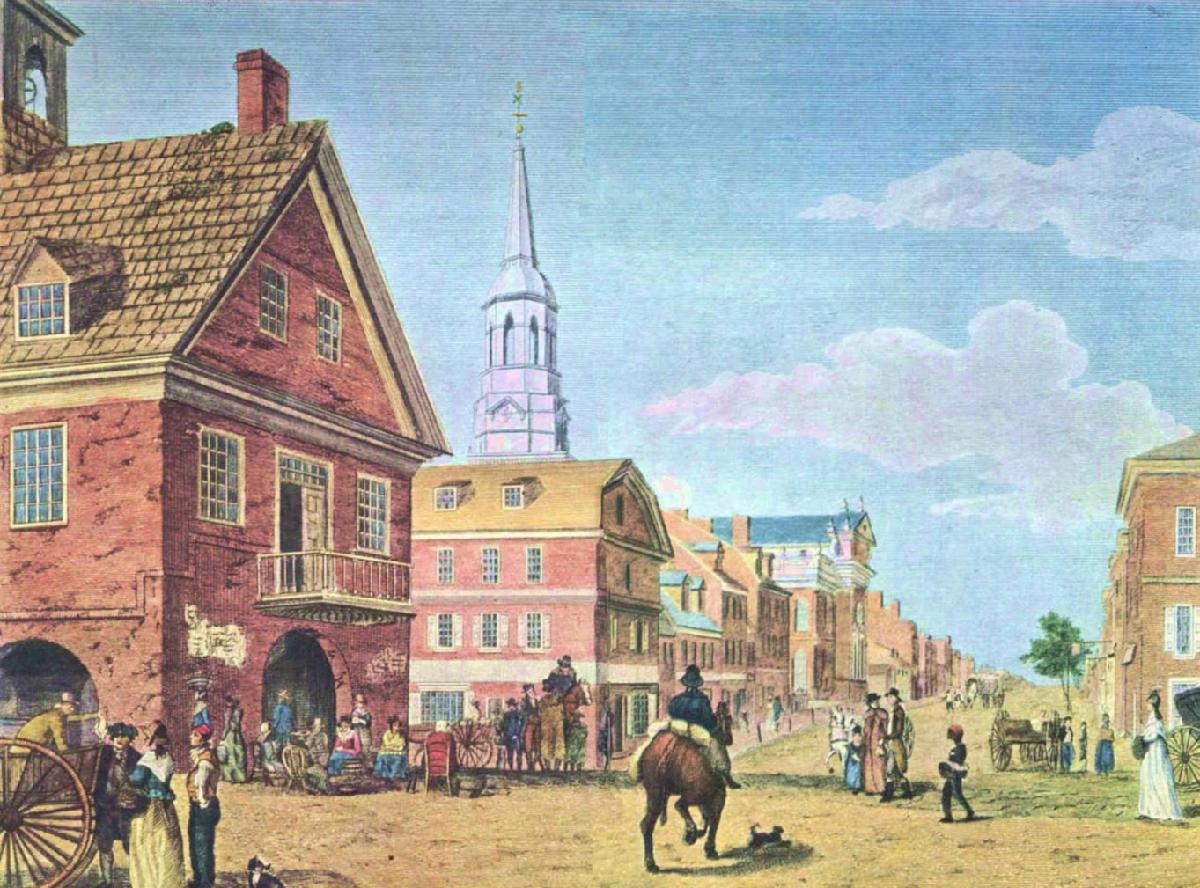
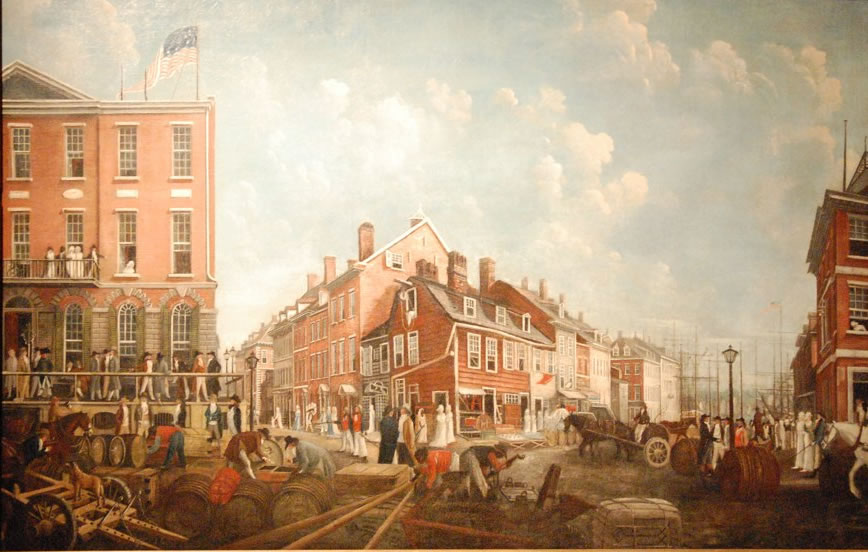
Tontine Coffee House in New York City – (around 1797)
New York Historical Society
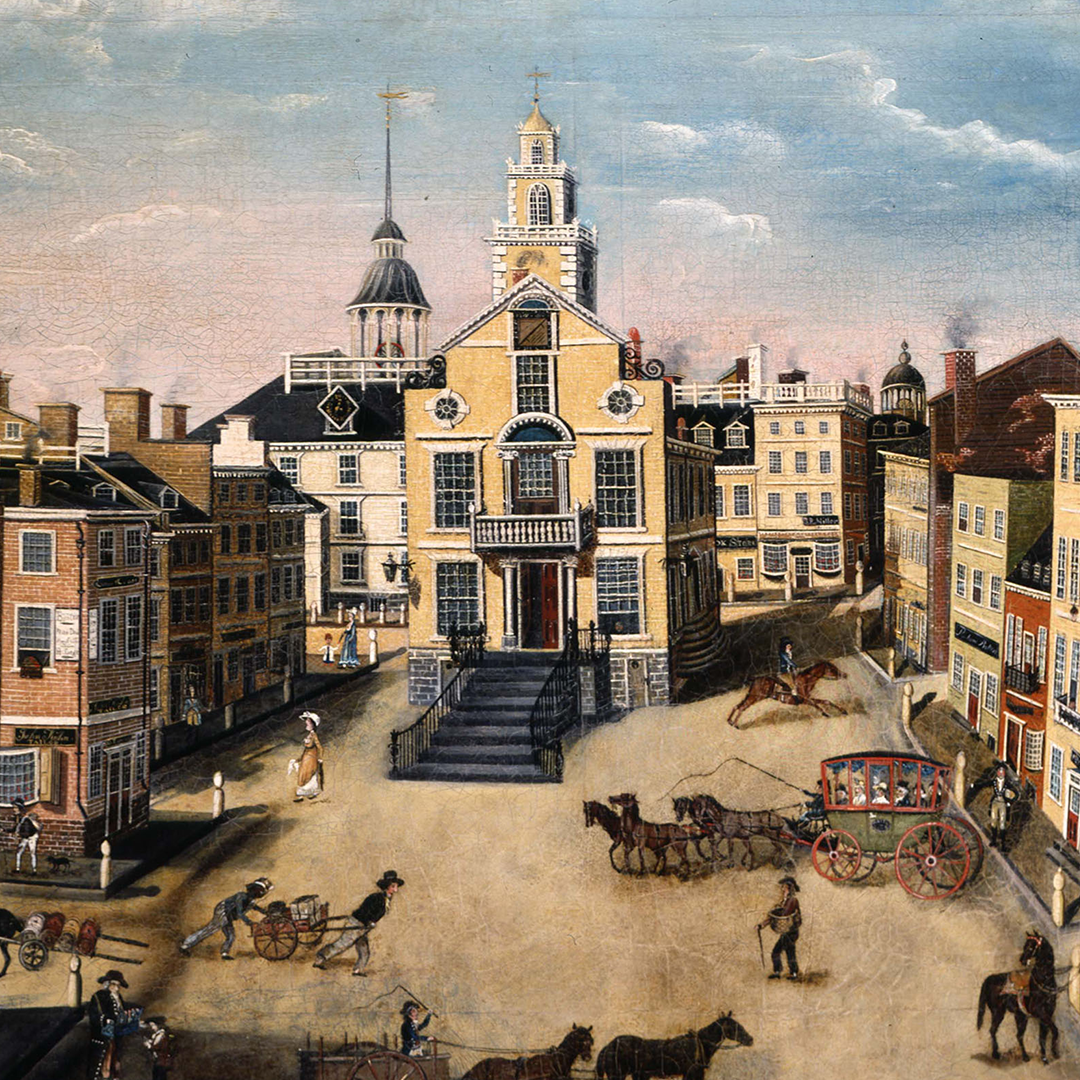
Boston – 1800


 Miles H. Hodges
Miles H. Hodges